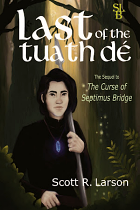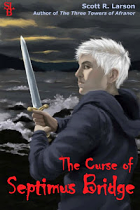Credit where credit is due
It was just like old times. A TV series spins a tale of a weird, wealthy family living in a massive mansion near the edge of a steep sea cliff. A young woman comes to work for them and over time becomes a virtual member of the clan—only to find there are so many dark secrets for her to uncover and maybe just a hint of something supernatural.
No, this wasn’t the long-hoped-for reboot/sequel of the series that obsessed me as a kid. I don’t think it was even intended as an homage, although with that many superficial similarities, you do have to wonder. On the other hand, the makers of this Netflix series were really only doing what the creators of Dark Shadows did back in the 1960s. They were just following the standard formula for the gothic novel genre while giving it a contemporary twist.
The Netflix series I’m talking about is Sirens and, yes, it does that Netflix thing of letting us wallow in the lives of rich people and showing us how screwed up they are. Okay, it’s not just a Netflix thing. Lots of series these days, even ones not on Netflix, have that same fixation, notably The White Lotus. There was something about Sirens, however, that not only caught enough of the spirit of early gothic DS (before it introduced Barnabas the vampire and went all full-blown horror movie matinee) but also created a cast of characters that were intriguing and relatable.
A lot of these recent wallow-in-how-weird-and-screwed-up-the-wealthy-are series, including The Perfect Couple and the aforementioned White Lotus, seem to include Meghann Fahy in the cast, but Sirens is the one where she really shines. Her raw, earthy Devon is lacking in judgment (or a filter) and has a long trail of bad decisions to prove it. Underneath her defiant, self-protective exterior, though, she basically has a good heart. Following an established pattern, she is determined to protect her younger sister Simone (Australia’s Milly Alcock), who seems to have been co-opted by the cult-like Kells family.
In the course of the series’ five episodes, things don’t go exactly as you might expect—a real plus in my book—and the ending is a surprise you cannot turn away from. Spoiler alert: there are no vampires, but that’s just fine.
The funny thing is that I started to write about another series I saw on the telly, but I got distracted because I wanted to share how much I liked Sirens. If Sirens tickled me because of memories it evoked about Dark Shadows, then the UK/Australian show Austin reminded me how much I love Doctor Who, especially the early episodes of the 2005 reboot. No, Austin is not about time travel or Gallifreyans or blue police telephone boxes—at least not directly.
Austin is about a prickly English children’s book author on a tour Down Under where he is confronted with the adult love child he never knew he had. Much humor is derived from this situation, thus making it a perfect example of that classic beast known as the situation comedy (sitcom to its familiars). Ben Miller is Julian, the curmudgeonly spinner of fanciful tales for tots who, in addition to getting caught out for a long-ago affair, finds himself canceled for having retweeted a sensible-sounding post from someone who turns out to be a neo-nazi. The delightful Sally Phillips (one of the best things about Miranda and Veep) is his understandably annoyed illustrator and wife. Michael Theo is the titular offspring who, in a further challenge to Julian’s flexibility and empathy is, as they say, on the spectrum. One of his many obsessions is Doctor Who, resulting in a bespoke London Who tour of sites associated with once and sometime (and maybe future?) Who star Billie Piper. The actor herself makes an appearance, and she comes off as every bit wonderful as we always liked to think she must be.
None of that, however, was why I felt compelled to share my enjoyment of the series with you. At the risk of being spoil-ery, I can tell you that I howled out loud at the conclusion of the penultimate episode because it made a significant plot point of something I have been crusading about for a long time. You see, in order to claw back his reputation from his cancellation and to burnish his sullied image, Julian participates in a self-serving documentary about finding the son he never knew he had. At the end of a test screening, Austin is left alone to watch the very end. When everyone else has left, he remains out of a conviction that a movie is not over until the last of the virtual celluloid has spooled out of the projector, stating that it is the least viewers can do for the hard-working crew named in the credits. I could not have said it better myself—although I have certainly tried.
What follows is one of a post-credits snippet that advances the story and sets up a humdinger of a final episode. Just as importantly, we get the first instance of which I am aware where the notion of staying to the last of the end credits plays a significant role in a movie or TV show.
Austin, you’re a man after my own heart.
-S.L., 4 July 2025
If you would like to respond to this commentary or to anything else on this web site, please send a message to feedback@scottsmovies.com. Messages sent to this address will be considered for publishing on the Feedback Page without attribution. (That means your name, email address or anything else that might identify you won’t be included.) Messages published will be at my discretion and subject to editing. But I promise not to leave something out just because it’s unflattering.
If you would like to send me a message but not have it considered for publishing, you can send it to scott@scottsmovies.com.





















